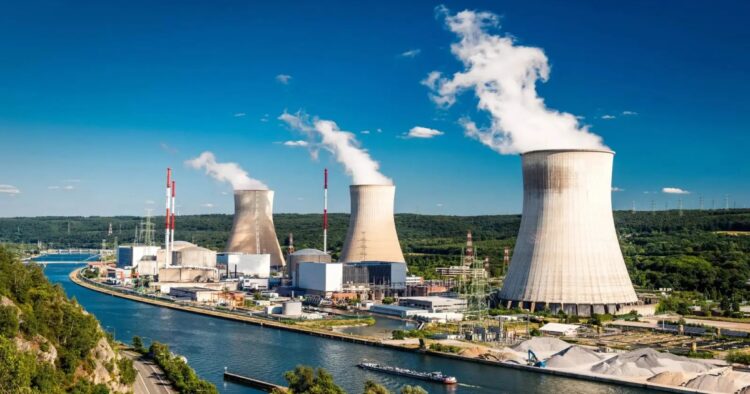KEY POINTS
- Govt plans to amend nuclear laws to cap supplier liability and allow private players.
- Foreign firms like GE-Hitachi and Holtec may enter India’s nuclear energy market.
- US has cleared Holtec to share SMR tech with Indian companies like L&T and TCE.
In a major development that could change the future of India’s nuclear energy sector, the government is preparing to introduce two important amendments to existing nuclear laws during the upcoming monsoon session of Parliament. These changes are expected to attract more investment, especially from foreign companies, and give a new life to the long-stalled Indo-US civil nuclear deal signed nearly two decades ago.
Let’s understand what these amendments are, why they matter, and what impact they could have on India’s nuclear future.
What Are the Two Key Amendments?
The First Amendment is related to the Civil Liability for Nuclear Damage Act, 2010. This law currently places significant liability on equipment suppliers in the event of a nuclear accident. That means if anything goes wrong in a nuclear plant, not only the plant operator but also the companies that supplied parts or technology could be held responsible, even after many years.
Foreign companies like GE-Hitachi, Westinghouse, and France’s Areva (now Framatome) have raised concerns about this law. They believe the risk of being held liable for accidents in India is too high and unclear. As a result, they’ve stayed away from the Indian market.
The proposed amendment will limit this liability, both in terms of money (to the original value of the contract) and in terms of time (setting a deadline for how long liability applies). This move is expected to make foreign companies more comfortable doing business in India’s nuclear sector.
The second amendment will focus on the Atomic Energy Act of 1962. Right now, only government-owned companies like NPCIL (Nuclear Power Corporation of India Ltd) and NTPC Ltd can build and operate nuclear power plants in India.
The amendment aims to allow private Indian companies to operate nuclear power plants, and in the future, even foreign companies could be allowed to invest in minority stakes in these projects. This could bring much-needed private sector efficiency and investment into the sector.
Why Is This Important for India?
India has one of the fastest-growing energy needs in the world. As of 2024, India’s installed nuclear power capacity is around 7,480 MW, which is only about 2% of the total energy mix. To reduce dependence on coal and meet climate goals, India needs to expand its nuclear power generation rapidly.
The government has already announced a target of installing 22,480 MW of nuclear capacity by 2031, but achieving this target requires huge investments, advanced technology, and faster implementation, something that private and foreign players can help with.
These amendments are also crucial for unlocking the full potential of the Indo-US Civil Nuclear Agreement signed in 2008. Although the agreement was historic, its benefits remained largely untapped due to legal barriers, mainly the liability law and restrictions on foreign participation.
Now, with the proposed changes, the commercial part of the deal could finally move forward. This could lead to US-based companies building nuclear reactors in India, transferring technology, and creating local jobs through manufacturing partnerships.
What Changed in the US Recently?
A major breakthrough came on March 26, 2024, when the US Department of Energy (DoE) gave regulatory clearance to Holtec International, a US-based company. This approval was related to Part 810 of Title 10 of the US Atomic Energy Act, also called ‘10CFR810’.
Previously, this law prevented US firms from doing any design or manufacturing work related to nuclear reactors in India, which was a big obstacle. But with the new approval, Holtec can now transfer its small modular reactor (SMR) technology to its Indian partners—Holtec Asia, Tata Consulting Engineers Ltd, and Larsen & Toubro Ltd.
This means India can now start co-producing advanced nuclear reactor components with American companies, which can help reduce costs and increase local manufacturing.
Now that the US has cleared the path from its side, all eyes are on New Delhi to pass the two key amendments. The government had already promised these changes in the Union Budget earlier this year, but getting the Parliament’s approval, especially on the liability law, might be a tough task, as it could face resistance from opposition parties and civil society groups concerned about nuclear safety.
However, if the amendments are passed, India could finally attract major global players, unlock billions in investment, and speed up its nuclear energy expansion.
A Turning Point for India’s Nuclear Future
These legal changes, if passed, could mark a historic turning point for India’s civil nuclear program. They would remove long-standing hurdles that have blocked foreign investments and technology transfers.
With global interest in nuclear energy rising again due to the climate crisis, India has a chance to become a major player in nuclear power generation, while also strengthening strategic ties with countries like the United States.
ALSO READ: “Trump Threatens To Bomb Iran If Nuclear Deal Isn’t Signed”

















Comments